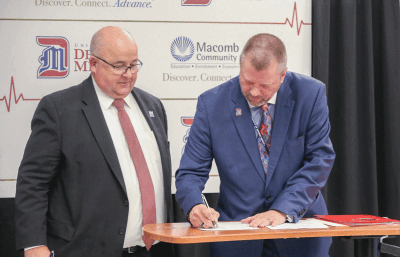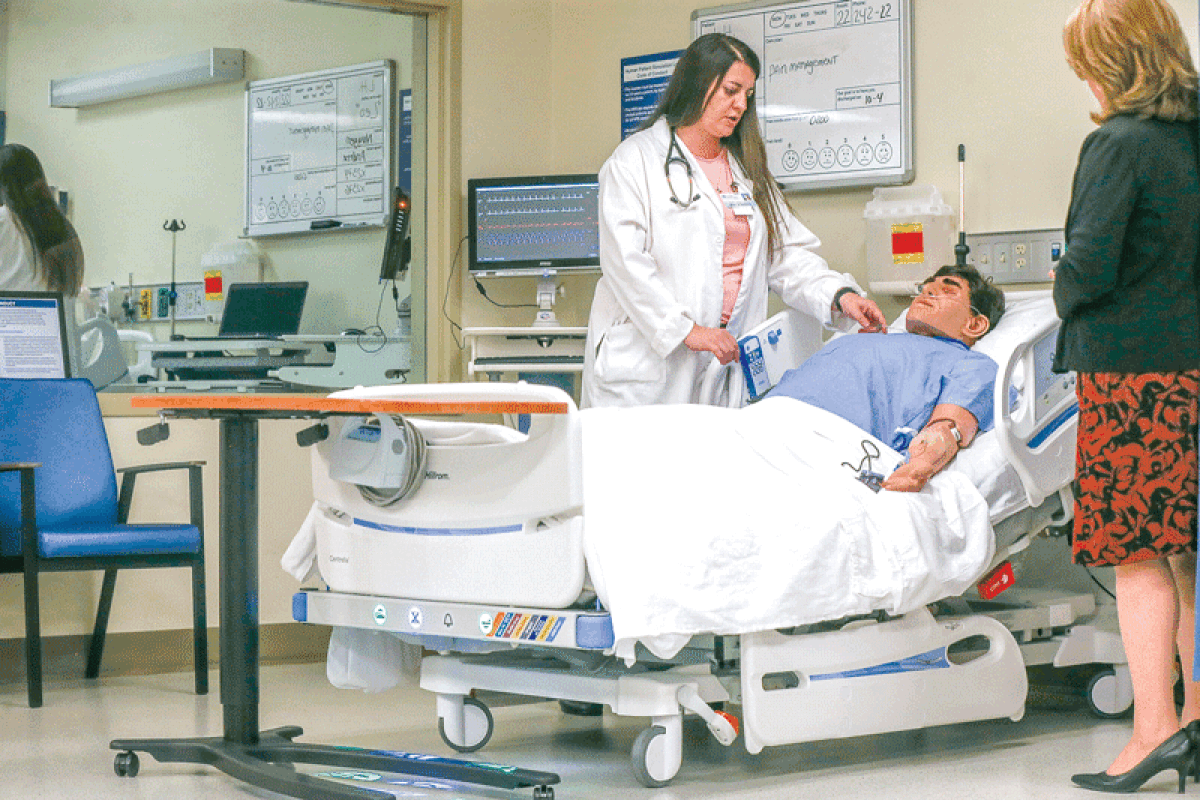
Macomb Community College President James Sawyer, left, and University of Detroit Mercy President Donald Taylor sign the BSN program agreement during a ceremony Oct. 2 on the Macomb Community College Center Campus in Clinton Township.
Photo by Patricia O’Blenes
CLINTON TOWNSHIP — Macomb Community College is expanding its nursing program through a partnership with University of Detroit Mercy.
On Oct. 2, a ceremony was held on the Center Campus of Macomb Community College to announce the two schools are partnering to offer a Bachelor of Science in Nursing, or BSN, program in Macomb County.
Macomb Community College President James Sawyer and Detroit Mercy President Donald Taylor both signed the partnership agreement at the ceremony, with several college faculty and local members of the medical field in attendance.
The new BSN program is designed to expand nursing education opportunities for recent Macomb graduates and practicing associate degree nurses. The program will be headquartered at the Macomb University Center on the Center Campus of Macomb Community College.
“It’s going to create a real seamless pathway for our associate degree nursing graduates to earn a bachelor’s degree,” Sawyer said. “We listened to our partners in terms of just how important it is to get more BSN graduates out there in the work world. We’re pleased to be able to play a part in trying to do that.”
The program’s first cohort of students will begin in January 2024 and the second cohort in August 2024. College officials expect to include between 12-25 students per cohort. According to Sawyer, the first two cohorts will have their tuition and fees paid through a $2 million grant from the State of Michigan.
“It’s specifically designed to speed up or promote those pathways from associate degree nursing to Bachelor of Science in Nursing,” Sawyer said. “We’re very excited that the grant will pay for their cost of education.”
In-person classes will be held on campus at the University Center, and staff will be on-site to offer advising, career services, financial aid and mental health counseling.
For those who attend full-time, the program will provide ADNs with an accelerated pathway to earning a BSN in 12 months. The coursework will consist of seven-week classes in 15-week semesters, with classes in face-to-face, online and hybrid formats. According to Sawyer, students who attend part-time can finish the program in two years.
“I’m really pleased at how collaborative it has been between administration, faculty staff and the two institutions that work together,” Taylor said. “As Jim said, the grant pays for the first two cohorts. After that, you can earn your bachelor’s degree here in nursing for $13,000. One year if you go full-time, and two years if you go part-time. I think you’re going to have a lot of your alumni who are going to be interested in this program with ADNs coming back and getting their BSN.”
The signing ceremony was held in one of the college’s current nursing classrooms that was designed to represent a hospital setting. On the main floor, there are mannequins in hospital beds that serve as patients. There’s also a geriatric room and a pediatric room on the floor.
“It allows us to mimic (an) acute care facility with private hospital rooms as well as an ER set up. We have two control rooms in this particular setting where two very independent scenarios can run at the same time,” said Narine Mirijanian, the dean of health and public service at Macomb. “This space is primarily used for our nursing students, but it’s also for our respiratory care students, our (occupational therapy assistant), (physical therapist assistant) students as well as our paramedic students.”
Students interested in participating in the BSN program need to apply for admission to Detroit Mercy and meet the university’s requirements. Those include having a 2.5 GPA, an ADN and an unencumbered nursing license from the state of Michigan.
For more information or to apply to the BSN program, contact Donna Gormely, Detroit Mercy admission counselor, at gormeldm@udmercy.edu.
 Publication select ▼
Publication select ▼



















